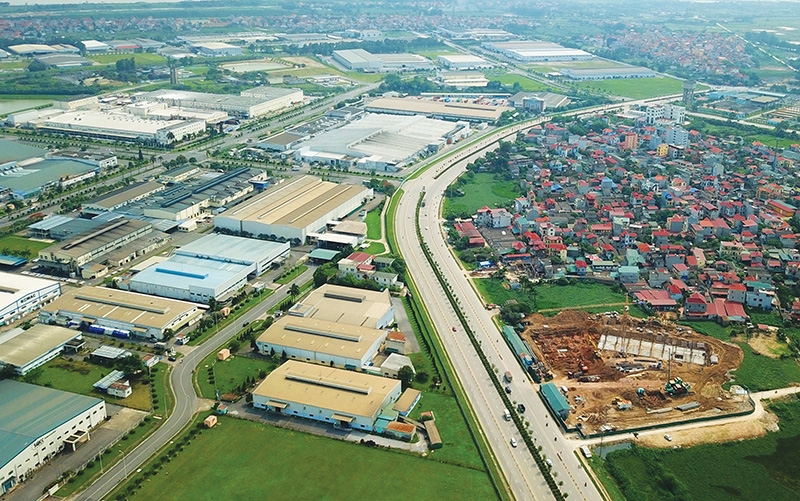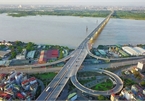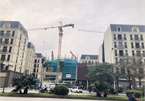 |
| Hanoi is receiving a host of new high-tech projects by major foreign investors, Photo: Le Toan |
As the world’s leading wireless technology innovator and the driving force behind the development, launch, and expansion of 5G, Qualcomm last week opened a new representative office and research and development (R&D) centre in Hanoi, making it the company’s first R&D facility in Southeast Asia.
“The new Hanoi office and R&D centre show Qualcomm’s long-term investment commitment and strong confidence in the local market. The new infrastructure will enable us to best serve customers’ demands,” said Nam Thieu, country manager of Qualcomm Vietnam, Laos, and Cambodia. “The Hanoi R&D centre is of strategic importance to Qualcomm.”
The US tech giant made the move after good performance in the country over the past years and is part of its strategy to expand further here. Qualcomm is one among hundreds of businesses which are seeking opportunities in Hanoi in the wake of its advantages which include a growing middle class, strong political geography, stable economic growth, and rising purchasing power.
New orientations
According to Hanoi Department of Planning and Investment (DPI), the city aims to attract high-quality foreign direct investment (FDI) and use it more effectively. The city’s FDI attraction strategy continues to focus on prioritised sectors for each foreign investor based on their expertise. Accordingly, the city’s most potential foreign investors will include South Korea, Singapore, Taiwan, the United States, the European Union, the United Kingdom, Australia, and New Zealand.
“Hanoi will focus on calling on foreign-invested projects with a priority to large-scale, high added value, high-tech, and environmentally-friendly projects of multinational corporations which help small- and medium-sized enterprises join global value chains, promote technology transfer, and develop the supporting industry,” said Nguyen Manh Quyen, director of the DPI.
Currently, companies from the US, Japan, South Korea, and the EU are heading to shift their investment out of China in the context of the US-China trade tensions, and now negative impacts from COVID-19 is accelerating the trend.
For example, Japan is spending about $2.2 billion in support for its companies to allocate their factories out of China to the home country, or to Southeast Asia.
In another case, Samsung Electronics has officially suspended mobile phone manufacturing in China, while other giants such as Sony, Apple, and Foxconn are planning for other locations outside China. In this context, Vietnam is gaining advantages thanks to its geographical location, low labour cost, and trained workforce.
As a result of the trend, Hanoi is moving to lure a new possible investment wave. As planned, the city will develop industrial parks (IPs) and industrial clusters (ICs) with infrastructure available to attract future possible investment shifts in the fields of healthcare and high-tech electronics manufacturing from multinational corporations.
It is also improving the business climate to increase its attraction.
Looking ahead, the city aims to lure about $30-40 billion worth of total registered FDI during 2021-2025, meaning $6-8 billion annually, to disburse $20-30 billion worth of FDI in this period; to increase the percentage of businesses applying advanced technology, and governance, and environment protection by 50 per cent by 2025 and to 100 per cent by 2030; raise localisation rate to over 30 per cent in 2025 and 40 per cent by 2030; and trained workforce to over 70 per cent in 2025 and 80 per cent by 2030.
Solutions
To achieve the targets in line with the country’s new FDI attraction strategy by 2030, the capital city will centre on six key solutions. It will continue to improve the business environment to create more favourable conditions for businesses and investors, as well as protect their legitimate benefits in economic, trade, and investment disputes. Secondly, “on-the spot” investment promotion will be strengthened.
As part of that, the city will continue to build an e-government to save time and cost for enterprises. Accordingly, public services can be fulfilled online such as business establishment registration, tax declaration and payment, customs, social insurance, registration of land-use right, and construction licensing.
Next, new investment policies will be worked out to leverage private investment. Moreover, special incentives for investors will be also built. In addition, land will be made more accessible. Specifically, Hanoi will check land funds at the approved IPs and ICs, and fast-track their infrastructure development while building a portfolio of projects calling for private investment.
Up till now, the city has 17 approved IPs, with five in preparation for infrastructure development and 107 ICs with 24 in the preparation process of construction.
Also importantly, investment disbursement will be enhanced, striving to reach about $2-4 billion a year on average, focusing on large-scale projects, and those in the field of manufacturing in IPs.
New opportunities
Evidently, Hanoi, which is now boosting plans to develop into a smart city, and sci-tech applications, considering them among the key tasks in the 2021-2025 period, is bringing about plenty of new prospects ahead for foreign investors, including Qualcomm in high-tech sectors.
In the front of realty, manufacturing and processing, trade and service, and agriculture, new opportunities are obvious on the back of the city’s 2021-2025 socio-economic development plan. Accordingly, investment attraction in transport infrastructure, seaports, energy, IT and communications, and agriculture will be intensified.
In anticipation of future growth potential, giants have been rushing to expand to and in Hanoi. They include Japan’s Nidec Chaun Choung Vietnam project of $174.5 million, the South Korea-invested Hanoi Lotte World Aquarium worth $47 million, the Twin Peaks expansion to $246 million, and TSQ Vietnam expansion of $67.5 million.
Similarly, other outstanding names like Sumitomo with its $4 billion smart city project and Samsung’s $220 million new R&D centre are speeding up expansion plans here.
A number of enterprises, including foreign-invested ones (FIEs) are now queuing up to get investment registration certificates in the city. As expected over 1,000 domestic and international businesses will participate in the upcoming investment promotion meeting, scheduled for June 27, when the capital city will grant investment certificates and a number of MoUs to dozens of investors (see box). Potential projects focus on ICs, IPs, outlets, new urban areas, and waste treatment systems, among others.
Moreover, the EU-Vietnam Free Trade Agreement, expected to take effect in the coming months, will further drive more EU investment into the city.
Hanoi is one of the country’s five most attractive destinations for foreign ventures. In the 2018-2019 period, the city always took the lead in FDI attraction with respective total registered FDI of $7.5 billion and $8.7 billion on the back of big improvements in the business climate.
In the first five months, Hanoi attracted $1.18 billion in FDI, which is expected to rise to $1.5 billion in the second quarter, and $2.5 billion in the first half of the year. It is expected that the figure will be $5 billion in 2020.
As shown in the Provincial Competitiveness Index (PCI) 2019, Hanoi gained 68.8 points, up 3.4 percentage points from the previous year, ranking ninth among the 63 cities and provinces. Remarkably, among the 10 PCI indexes, the city saw eight improvements, such as land access (up 15 steps), and transparency and information access (up 19 notches).
On this growth momentum, Hanoi remains an appealing spot despite the pandemic. In the first five months of 2020, it attracted over $1.18 billion worth of FDI. Singapore is the city’s biggest foreign investor with $262.7 million, followed by Japan, Taiwan, and South Korea. In the second half the capital targets to attract $2.75 billion FDI, thus enabling it to increase the figure to $5 billion by year-end.
|
Hanoi will host an investment promotion conference on June 27, expecting to attract over 1,000 domestic and international businesses, as well as government leaders and international organisations. Themed “Hanoi 2020 – Investment Co-operation and Development”, the event will provide an update on its socio-economic development and FDI attraction performance between 2016 and 2019, as well as its FDI attraction orientations in 2020 and the coming years. Ministries, agencies, and businesses will also give their recommendations for Hanoi’s investment attraction. Seven foreign-invested projects will be licensed with the total registered capital of $1.24 billion. VIR |
Bich Thuy

Hanoi receives 36 proposals for investment cooperation worth $26b
The capital city of Ha Noi as of Monday received 36 proposals for memorandums (MoU) of understanding for investment cooperation, which were estimated to be worth more than US$26 billion in total.

Foreigners allowed to own homes in 22 Hanoi commercial housing projects
The Hanoi Department of Construction has listed 22 commercial housing projects, some complete and some under construction, where foreigners can own homes.